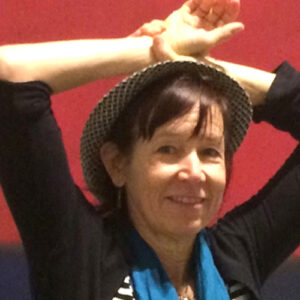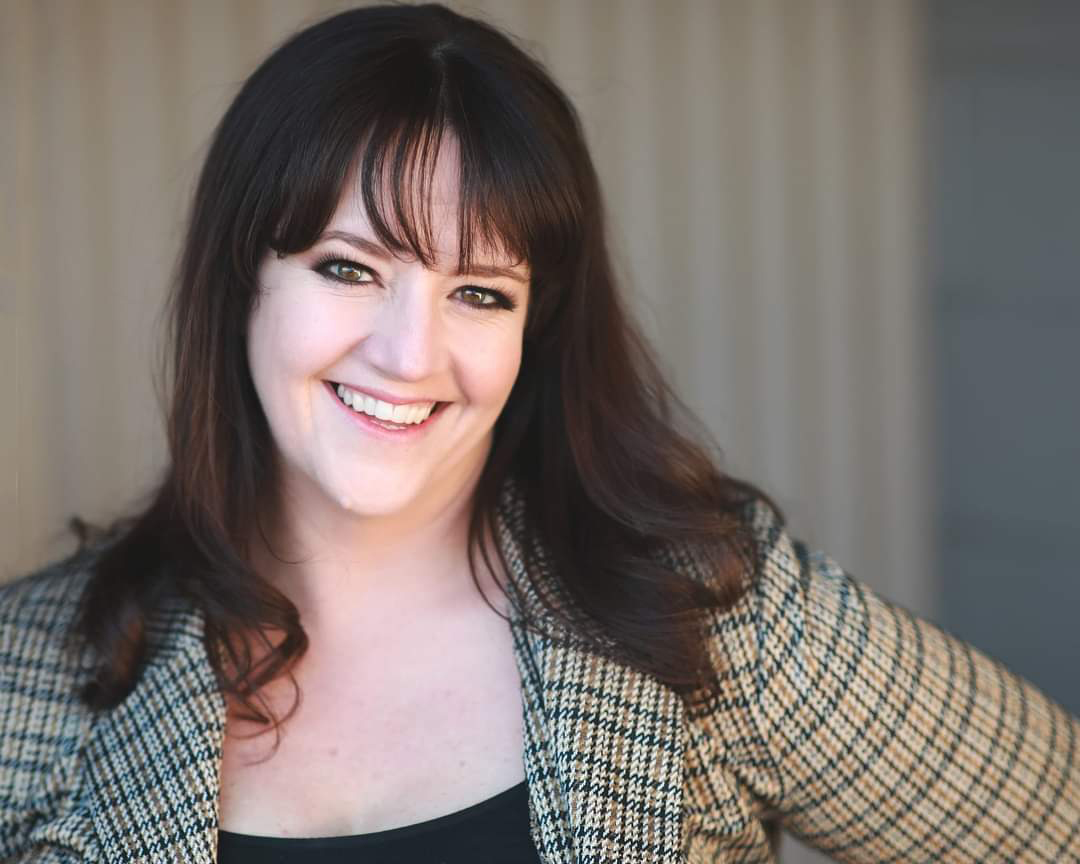
Interview with Jen Coogan, Music Director, Composer, & Sound Designer for Free Shakespeare in the Park’s The Two Gentlemen of Verona
August 13, 2025
Photo courtesy of Jen Coogan

Composer/Sound Designer Jen Coogan talks about her creative approach to composing and music for “The Two Gentlemen of Verona.”
INTERVIEW
SF Shakes: How would you characterize your relationship with music?
Coogan: It’s been a lifelong relationship. I think I’ve always been drawn to melody and lyrics in my younger days and that definitely manifested as a life as a performer. I followed a lot of music paths; I took guitar as a kid, I took piano, but my main love was singing, especially musical theater songs. My dad introduced me to all the classical musical theater movies and I just fell in love. It became a part of my life. I grew up doing theater.
As I got older, I realized that there just weren’t enough opportunities for women in theater and I was just really driven to create more of them — to just kind of tear down the gates of needing permission to do your art.
I was in a production of “Rent” and [the cast] was like, “How do we get to continue on and perform and get permission to do the show and all these things”? That really spawned me to reteach myself the piano that had fallen away since I was a kid. I plunked out Sara Bareilles songs and it really clicked for the first time in my life that I could sing and play the piano at the same time; that clicked into this whole obsession of playing live music.
My husband and I decided to move to San Francisco and pursue our passion and our careers in the arts. I was driving over the Bay Bridge and I heard “Hamilton” for the first time and it just changed my life. I was like, “Oh my God, musical theater is what I’m supposed to be writing”. From that moment on, my whole path became storytelling through music — incorporating all the different aspects of my life, my love of musical theater, and my journey of music through all these different levels and experiences I’ve had that have brought me here today.
SF Shakes: What would you say are your main musical influences?
Coogan: Definitely musical theater — classical musical theater, from everything like Rogers and Hammerstein to Marvin Hamlisch and “A Chorus Line” to Jonathan Larson and “Rent”. I also grew up singing Italian arias, so a lot of the Italian folk songs, a lot of soprano songs in general. I also worked a lot of weddings and so I incorporated all of the Top 40 dance music in my life that I wanted to weave into my music. It’s definitely a mix of old and modern.
SF Shakes: How would you say your background as a singer has influenced your composition process?
Coogan: I feel really blessed to have my voice as a part of my writing ability. I definitely compose more by ear and more by feel and emotion. Being able to use my voice as a writing tool has been super helpful for me.
[It’s been] really enjoyable to explore all these different characters. I can sing parts that I would never be cast as in real life. I can be [of] different genders. I can do different styles of music that I wouldn’t necessarily think I had permission to sing. It just lets me explore things in a different way.
It’s made me want to write a lot of songs for women because I find myself singing [the songs] as I’m writing them. That leads me to a different avenue instead of writing something and then being like, “OK, how do I make sure that this is in the right key for a different gender?” It’s definitely been a gift.
SF Shakes: What is your composition process like?
Coogan: It basically changes with every show, every song. It’s always starting over with the blank piece of paper and that’s really the only thing that they all have in common. Sometimes it’ll be a drum beat that inspires me, sometimes it’ll be a bass riff, sometimes it’ll be pure melody and lyrics. I try to focus on the story that we’re trying to tell here. What is the moment of change in this song that needs to be highlighted with music? Why is music the right choice here? What is being said with the song that can’t be said with words? I try to follow that path emotionally. I’ll find some riff or chord progression that evokes a feeling and then it’s just pulling the thread.
SF Shakes: What story is being told in “The Two Gentlemen of Verona” through song?
Coogan: I’m trying to weave a lot of fun into it. It’s love and friendship and all the different explorations that we can go through in that journey. I’m exploring a kind of light take on it but infusing a lot of humor. Ely is really giving us a clear vision. We’re starting in the Midwest and then we’re traveling to California. It’s an Americana vibe and a lot of singer-songwriter feelings, so I try to involve all of that in the music.
SF Shakes: What inspiration did you draw from for “Who Is Sylvia?”?
Coogan: We had a list. [Ely] had a list of inspirations that he sent me as a broad view of the show, sonically like the Avett Brothers, the Lumineers — singer-songwriter vibes — [also] back to some old school stuff that my parents would listen to like Crosby & Nash. That was more of my Midwest vibe. There’s a little bit [of an] older (more piano) vibe. We moved into “Who Is Sylvia?” in California and it’s big kick drums, a lot of reverb, fun nylon and ukulele guitar. We laid a foundation and wove in more “call and response” and repeats with the audience. We have these almost Muppet-type characters that have some silliness, and a lot of different characters that they bring into the song to make it more fun.
SF Shakes: How did you go about writing the song, especially since you were setting text to music?
Coogan: It’s always a little intimidating because the verse is so strong with what [Shakespeare] has given us. Songs weren’t structured in the same way back then so I always try to structure them a little bit differently but using the exact same lyrics. For example, I’ll take a line and I’ll repeat it here and there to create more of a chorus. We add in some “oh’s” and some “hey’s” and some stomps and that gives it the feel of the style we were trying to imitate.
SF Shakes: Did you run into any issues setting Shakespearean English to a more modern music style?
Coogan: I found this show to be easier than a couple of the previous shows that I’ve worked on because it was such a fun, comical moment. Ely’s direction gave me those chorus Muppet parts to play off of and set the tone for me, [which was] this isn’t strict Shakespeare. This is fun. This is different.
He gave me a couple of one-liners that I was able to add into the show that really shifted it from being a straight Shakespearean feeling to something that’s a little bit more contemporary. I feel overall Proteus seems so cocky and flirty in this moment and fun and really relatable, so that was what I tried to highlight.
SF Shakes: How does the song interact with the rest of the text and the characters, and also thai moment in the play?
Coogan: I’d like to think that it brings it all together into this glue that really lets us feel what these characters are in the middle of. It gives us that moment of, “What’s gonna happen next with these people”? [The song] is something that’s shifting everything.
SF Shakes: I definitely get a feel of these characters traversing something, emotionally.
Coogan: I wanted everything to have that journey vibe. We’re always moving. We’re always transitioning to the next place. It’s always flowing along.
SF Shakes: I think that works really well. A lot of [this production] is about migration and finding identity in new unfamiliar places. What’s your favorite part of this song?
Coogan: I love the end when it starts getting completely chaotic. We get the audience involved. We get the silliness of these characters and we get this huge chorus that, by the time you’ve heard it, you know it. I’m really excited to see how the audience taps into that moment and hears how awesome our cast is. We have such talented singers and I’m so excited to share that with the community.
SF Shakes: Writing a song that’s meant to be performed in an open space versus a closed theater must be pretty different.
Coogan: You can’t ignore that you’re outside, that other things could happening; you could be competing with a child having a tantrum on the playground or a dog barking or someone honking down the street, and so I think it’s important to make sure that everything is really big, that our ensemble is clicked in on the melodies, and that we have something that fully engages the audience. We’re gonna have the audience tuned in a little bit to some of the melodies and some of the call-and-responses before the show even starts. They’re gonna be ready and in gear to help us do that.
With big spaces you want to make sure that you have the audience’s attention because you don’t have the focus quite as easily as you do in a closed theater.
SF Shakes: It’s been amazing seeing it all come together. What has it been like being so far away from rehearsals?
Coogan: It’s kind of been killing me to be so far away from everything because I’m more in the room and more involved, but it’s still been really productive doing it from a distance. Doing music rehearsals was so different for us but that was a really beautiful thing to see where they’re at and to be a part of. I can’t wait to be in person and see all of the things that are happening.
RECENT POSTS